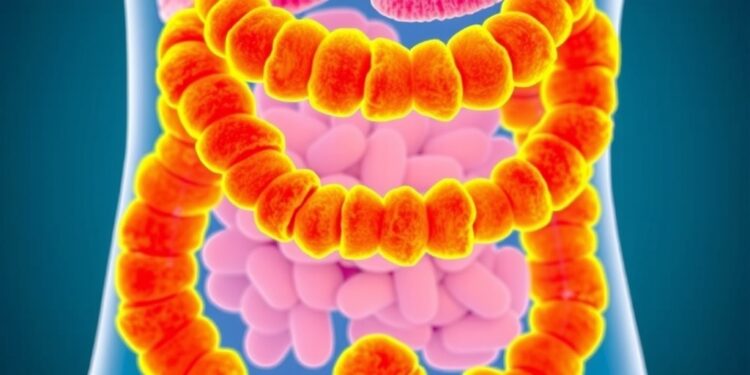
A recent groundbreaking study has unveiled the intricate workings of a beneficial gut microbe known as Akkermansia muciniphila (AM). This microbe has been extensively linked to promoting health and preventing various diseases. The research, published in the esteemed journal Nature Microbiology, presents a detailed investigation into the dietary preferences of AM, particularly its unique ability to digest sugars embedded within mucus. This new understanding not only sheds light on the complex interactions within the human gut environment but also offers potential avenues for therapeutic interventions against certain health conditions.
At the heart of the study lies a comprehensive analysis of 66 enzymes that enable Akkermansia muciniphila to effectively metabolize mucin—a protein that constitutes the primary component of mucus secreted throughout the gastrointestinal tract. Utilizing a pig model, the researchers led by Dr. Lucy Crouch from the University of Birmingham successfully demonstrated that a specific combination of enzymes derived from AM could entirely decompose mucin. This pivotal finding lays the groundwork for future exploration of how microbial communities in the gut utilize the resources available to them, potentially leading to significant advancements in our understanding of gut health.
In their research, the team delved into the molecular mechanisms through which Akkermansia muciniphila breaks down O-linked sugars. This aspect of digestion is crucial, as the mucous layer that lines the gastrointestinal tract plays an essential role in protecting the gut lining and facilitating nutrient absorption. The study’s findings are groundbreaking, as they represent the first time researchers have fully characterized the enzymatic profiles of a microbe capable of completely degrading the glycan components of mucin.
Dr. Crouch articulated the significance of this research, stating, “This is the first time that we have comprehensively seen how microbes break down the food source O-linked sugars in the gut.” The potency of these newly characterized enzymes extends beyond mere digestion; they may also aid in identifying different glycan structures produced by humans that could serve as biomarkers for various diseases.
The relationship between microorganisms and their human hosts is dynamic and multifaceted. Akkermansia muciniphila interacts intimately with the gut environment, voraciously consuming the mucus produced by the host. This relationship is believed to yield multiple benefits, including the modulation of metabolic functions and the enhancement of immune responses. The insights gathered from this study reveal that the microbe is alert to alterations in its surroundings, particularly shifts in dietary fiber intake, which significantly affect its levels in the gut.
Moreover, the research indicates that lower levels of Akkermansia muciniphila are associated with negative health outcomes such as inflammatory conditions and metabolic disorders, including diabetes. In recent years, the importance of maintaining a balanced gut microbiome has been underscored, as emerging evidence highlights its vital role in overall health. The presence of Akkermansia muciniphila alongside a fiber-rich diet appears to promote a healthier gut ecosystem, potentially averting the onset of various diseases.
The significance of understanding Akkermansia muciniphila’s enzymatic capabilities cannot be overstated. These enzymes are not merely tools for digestion; they can be instrumental in altering the glycan structures found in the gut. Since glycans often serve as receptors for pathogenic organisms and their toxins, manipulating these structures might have profound implications for disease prevention and management. As Dr. Crouch noted, “if we can modify the glycans, we may be able to change the severity of disease.”
The comprehensive nature of this study sets a foundation for future research endeavors. Identifying specific enzyme pathways that Akkermansia muciniphila utilizes could facilitate the development of targeted therapeutic strategies aimed at enhancing gut health. Furthermore, exploring the interactions between this microbe and various pathogens offers promising avenues for understanding how disruptions in the gut microbiome can lead to increased susceptibility to diseases.
As researchers continue to decode the complexities of gut microbe interactions, it is essential to recognize the critical role of lifestyle factors, such as diet, in shaping an individual’s microbiome. The findings from this study reinforce the idea that maintaining a healthy diet rich in fiber not only fuels beneficial microorganisms like Akkermansia muciniphila but also serves as a deterrent against the proliferation of harmful bacteria.
In summary, this study represents a significant leap forward in our understanding of the symbiotic relationships within the human gut. By unraveling the mechanisms that enable Akkermansia muciniphila to thrive and digest mucin effectively, researchers are paving the way for innovative therapeutic strategies that could transform approaches to healthcare. Continued exploration of this essential microbe will undoubtedly yield valuable insights into the intricate workings of human health and disease.
Subject of Research: Cells
Article Title: Carbohydrate-active enzymes from Akkermansia muciniphila break down mucin O-glycans to completion
News Publication Date: 31-Jan-2025
Web References: Nature Microbiology
References: Nature Microbiology
Image Credits: University of Birmingham
Keywords: Microbiology, Gut health, Akkermansia muciniphila, Mucus, Enzymatic breakdown, Gut microbiota, Gut-brain axis, Dietary requirements, Metabolic health, Therapeutic implications.
Tags: advancements in understanding gut bacteria.Akkermansia muciniphila gut healthbeneficial gut microbes and healthbreakthroughs in gut microbiome studiesdietary preferences of gut microbesinteractions within human gut environmentmicrobiome and disease preventionmucin degradation enzymesNature Microbiology publicationpig model research in microbiologysugar metabolism in gut bacteriatherapeutic interventions for gut health





